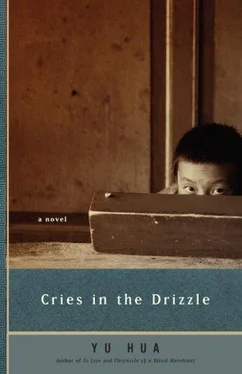The teacher came up to me at one point and said to me solicitously, “If you hold it a bit tighter, it will melt more quickly.”
The snow had not melted much by the time the class ended. After the teacher picked up his notes and slipped past me, my classmates gathered round. Their speculation about how long it would take for the snowball to melt simply intensified my distress, and I felt so misused I almost cried. Guoqing and Liu Xiaoqing marched over to the girl's desk in a rage, cursing her as a snitch and flunky. The poor girl collapsed in a flood of tears, and after putting her satchel in order she stood up and headed out the door, saying she was going to report them to the teacher. It had not occurred to Guoqing and Liu Xiaoqing that she would resort to this same tactic a second time; they rushed to restrain her, apologizing and begging forgiveness. By this point, my hands had gone completely numb— as hard as icicles — and the snowball fell from my lifeless fingers to the floor, where it broke up into slush. I was so horrified that I burst into slushy tears of my own, at the same time begging the classmates around me to bear witness: “I didn't do it on purpose! You saw what happened — I didn't do it on purpose!”
Our teacher's authority was not founded on correct judgments, but on draconian punishments that followed in the wake of the judgments that he did make. He was altogether too arbitrary in his decisions about right or wrong, and for that very reason his punishments would arrive suddenly and unpredictably. During my four years at the Littlemarsh elementary school he never once repeated a punishment. Because of his exceptional creativity in this area we were reduced to nervous wrecks at the very sight of him.
On one occasion a dozen of us were throwing a ball around in the playground, and by accident we broke a window in the classroom. In this case the penalty he imposed was light, but because I had not expected to be punished I performed a feeble act of resistance.
I still remember the look of misery on the face of the boy who broke the window. Even before the teacher stepped into the room he was already in despair, visualizing the awful punishment that awaited him. Then the teacher came in and stood beaming on the dais — I suspect that he was overjoyed every time there was an opportunity to punish a pupil. But as always he came out with a ruling that was not at all what we anticipated: he did not punish the guilty classmate directly but told all of us who had been playing ball to raise our hands. Then he said to us, “Each one of you is to write a self-criticism.”
Although this decree was perfectly in keeping with his trademark style, at the time I was really shocked. I felt that I had done nothing wrong, so why should I have to write a self-criticism? The voice of resistance stirred in my heart: I would simply refuse to do it. For the first time in my life I would defy an adult — defy moreover, the teacher who made every schoolchild quake in his boots.
I did my best to steady my nerves, though actually I was very unsure of myself. After class I tried to incite the other classmates affected to resist the teacher as well. They expressed their dissatisfaction just as heatedly as me, but they hemmed and hawed when it came to refusing to write the self-criticism. Guoqing shrugged it off, saying to me, “It doesn't matter if we write a self-criticism now, because there is no dossier on us yet. Its when you start working that you can't afford to write one, because then it goes into your file.”
I was on my own, clearly, but I took the plunge anyway. Loudly I declared that I would not write a self-criticism, no matter what. My classmates looked at me in wonder. My voice shook, and I felt that I, a ten-year-old, had truth on my side. Yes, I was right. The teacher had said so himself, that it's impossible not to have weaknesses. “The teacher sometimes can be wrong ”—that was what I told them.
I spent the whole day full of myself; here I was, just a child, but already I could recognize the defects of grown-ups! I imagined the following scene: the teacher and I would engage in a debate in class, and because I had justice on my side I would speak with great eloquence and brilliant witticisms would slip effortlessly from my tongue. Even though the teacher was an able debater, he could not call on truth to support him, so of course he would lose the argument. He would make a touching admission to this effect and praise me with fine words. The girls would all look at me with admiration — the boys too, of course — and they would praise me as well (by that age I already knew it was a pleasure to be liked by girls). At this point my imagination had to take a rest because tears filled my eyes. I wanted to savor this blissful scene.
While my emotions ran high, our teacher was cool and collected and paid me no mind. This made me nervous and I couldn't help but challenge my own judgment: could it be that the teacher was right? I had been involved in the game, after all, and if I hadn't thrown the ball to Liu Xiaoqing, who threw it to that other boy, how could he have broken the window? I ended up worrying myself sick, and the idea of debating the teacher in class seemed preposterous.
But then my confidence revived, courtesy of Li Xiuying. When cleaning the window, I could not stop myself from asking her if it was all right for me to throw a ball on the playground. Li Xiuying said that of course I could. Then I asked her whether I was at fault if one of my classmates broke a window. Her answer was even firmer: “If somebody else broke it, what has that got to do with you?”
Vindicated at last, I was no longer afraid of my own shadow. Nobody could alter my conviction that I was right.
In the face of the teacher's continued indifference, it was not long before this newfound self-possession began to wane, and dejection set in. At first I had been so looking forward to conducting a debate with the teacher. At night I would prepare feverishly, and in the morning give myself a pep talk. But at the sound of the class bell my heart would thump. My greatest worry was that I would have stage fright and be unable to say a word when the moment came. The teacher's lack of interest only fueled my insecurity. Eventually, however, my equilibrium was restored, as I put the incident behind me and began to forget about it. The teacher might well have forgotten about it ages ago, I told myself. The Imperial Army was in town again and he would be wreathed with smiles at the end of the day.
It was as though I had simply been arguing with myself in my own mind, playing both the teacher and myself at the same time, and now at last I abandoned the game out of sheer exhaustion. I threw myself instead into playground activities, reclaiming my childhood, running and shouting without a care in the world. But then Guoqing came over to tell me that the teacher wanted to see me.
At once I was seized by anxiety, and despite the bright sunshine I gave a shiver as I headed off toward the teacher's office. The carefree shouts of Guoqing and the others sounded behind me, and I knew that the moment I had been anticipating and now dreaded had finally arrived. Although I tried desperately to retrieve the brilliant arguments that I had been rehearsing for so long, not a single one now came to mind. I could feel my lips trembling and was on the verge of bursting into tears, but I urged myself not to cry, to be brave. No doubt the teacher would scold me most harshly, and maybe he would come up with some outlandish way of punishing me, but I must not cry, because I had done nothing wrong. That's right, I had done nothing wrong — it was the teacher who was wrong. That's what I should say to him. I needed to speak slowly and not be browbeaten by a burst of rage or alarmed by a cheery grin. With these thoughts swirling in my head I entered the teacher's office, relieved that I had recovered my courage once again.
Читать дальше












